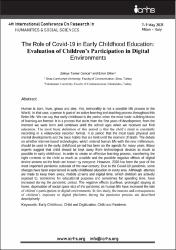| dc.contributor.author | TAMER GENCER, ZEKİYE | |
| dc.contributor.author | Diker, Ersin | |
| dc.date.accessioned | 2022-05-13T06:41:19Z | |
| dc.date.available | 2022-05-13T06:41:19Z | |
| dc.date.issued | 7-9 MAYIS 2021 | tr |
| dc.identifier.citation | Zekiye Tamer Gencer 1/ Ersin Diker 2
1 Sivas Cumhuriyet University, Faculty of Communication, Sivas, Turkey
2 Gümüşhane University, Faculty of Communication, Gümüşhane, Turkey | tr |
| dc.identifier.uri | https://hdl.handle.net/20.500.12418/12950 | |
| dc.description.abstract | Human is born, lives, grows and dies. Yet, immorality is not a possible life process in the World. In that case, a person is part of an active learning and teaching process throughout this finite life. We can say that early childhood is the period when the most basic building blocks of learning are formed. It is a process that starts from the first years of development, from the moment we were born and continues until the school ages when we received our first education. The most basic definition of this period is that the child’s mind is constantly recording in a video/voice recorder format. It is period that the most basic physical and mental developments and the basic habits that are held until the moment of death. The debate on whether internet-based technologies, which entered human life with the new millennium, should be used in the early childhood period has been on the agenda for many years. Many experts suggest that child should be kept away from technological devices as mush as possible in early childhood. In order to create an effective learning process, transferring the right contents to the child as much as possible and the possible negative effects of digital device screens on the brain are known by everyone. However, 2020 has been the year of the most important pandemic outbreak of the new century. Due to the Covid-19 pandemic, some changes have been experienced in early childhood education in every area. Although attemps are made to keep them away, mobile screens and digital time, which children are actively exposed to, sometimes for educational purposes and sometimes for spending time, have increased during the pandemic period. The negative effects (curfews, prolonged staying at home, deprivation of social space etc) of the pandemic on human life have increased the rate of chilren’s participation in digital environments. In this study, the reasons and consequences of children’s exposure to digital platforms during the pandemic process are described descriptively. | tr |
| dc.language.iso | eng | tr |
| dc.publisher | 4th International Conference on Research in Humanities and Social Sciences | tr |
| dc.rights | info:eu-repo/semantics/openAccess | tr |
| dc.subject | Early Childhood | tr |
| dc.subject | Child and Digitization | tr |
| dc.subject | Child and Pandemic | tr |
| dc.title | The Role of Covid-19 in Early Childhood Education: Evaluation of Children’s Participation in Digital Environments | tr |
| dc.type | animation | tr |
| dc.relation.journal | 4th International Conference on Research in Humanities and Social Sciences | tr |
| dc.contributor.department | Sosyal Bilimler Enstitüsü | tr |
| dc.contributor.authorID | 0000-0001-6065-7395 | tr |
| dc.relation.publicationcategory | Uluslararası Konferans Öğesi | tr |















